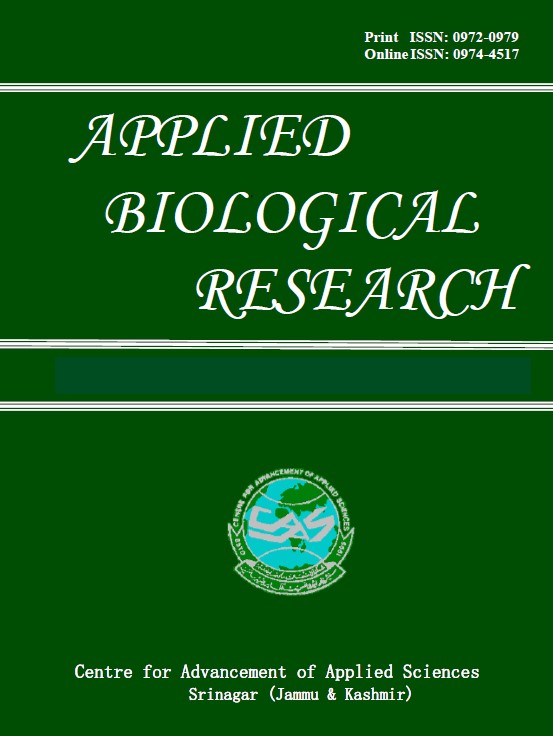Changes In Some Serum Enzymes And Urea Nitrogen In Neonatal Bovine Diarrheic Calves Of Different Age Groups
DOI:
https://doi.org/10.48165/Keywords:
Neonatal calf diarrhea, serum enzymes, urea nitrogenAbstract
The present study was conducted on 100 cases of bovine calf diarrhea to monitor the activities of some serum enzymes viz., AST, ALP, GGT, CK and urea nitrogen in neonatal calves of different age groups. These calves were divided into 5 age groups viz., 1-7 day (7 calves), 8-14 days (5 calves), 15-21 days (30 calves), 22-30 days (19 calves) and 31-60 days (39 calves). The results of experimental groups were compared with normal standard values of different age groups. The diseased calves of all the age groups had significantly higher (p<0.01) serum AST activities as well as urea nitrogen as compared to control. Serum ALP activities were significantly low (p<0.01) in diseased calves of 8-14 days, 15-21 days and 31-60 days age groups. Alterations in other parameters were significant in specific age groups only.
Downloads
References
Agrawal, D.K., Singh, N.P. and Chauhan, R.S. 2002. Clinico-pathomorphological studies on rotavirus infection in neonatal calves. Indian Journal of Veterinary Medicine, 22: 85-88. Alam, M.R., Kim, W.I., Kim, J.W., Na, C.S. and Kim, N.S. 2012. Effects of chitosan oligosaccharide on diarrhea in Hanwoo calves. Veterinarni Medicina, 57: 385-393. El-Sheikh Abdel Khalek, R. 1987. Studies on Dehydration in Calves. Ph. D. thesis, submitted to the Faculty of Veterinary Mededicine, Zagazig University, Egypt.
El-Sheikh Abdel Khalek, R., Attai, H. and Selim, H. 2004. Textbook of Veterinary Internal Medicine (2nd edn.). Shahwan Liberary, Zagazig, Egypt.
El-Sheikh Abdel Khalek, R. 2011. Diarrhoea and Dehydration in Calves and Cattle (Arabic and English Textbook), Shahwan liberary, Zagazig, Egypt.
Serum enzymes in neonatal bovine diarrheic calves 93
El-sheikh Abdel Khalek, R., Morsy, H.M.S., Allam Abbas, T.H. and Abdelrazik, W.M. 2012. Clinical and laboratory examinations of diarrhea and dehydration in newborn Friesian calves with special reference to therapy with hypertonic and isotonic solution. Life Science Journal, 9: 181-184.
Grodzki, K., Lechowski, R. and Lenarcik, M. 1991. The biochemical profile of calves' liver in the course of diarrhea during the first 10 days of life. Polish Archives Weter, 31(3-4):49-63. Groutides, C.P. and Michell, R. 1990. Changes in plasma composition in calves surviving or dying from diarrhea. British Veterinary Journal, 146: 205-210.
Guzelbektes, H., Coskun, A. and Sen, I. 2007. Relationship between the degree of dehydration and the balance of acid based changes in dehydrated calves with diarrhea. Bulletin of the Veterinary Institute in Pulawy, 51: 83-87.
Hussain, A., Javed, M.T., Khan, A., Naz, N.A., Sultan, M.A. and Niaz, B. 2001. Comparison of treatment trials in induced E. coli diarrhea: Affects on some serum biochemical parameters. Pakistan Veterinary Journal, 21: 65-71.
Lechowski, R. 1996. Changes in the profile of liver enzymes in new born calves induced by experimental, sub clinical acidosis in pregnant cows and osmotic diarrhea. Veterinary Research Communications, 20: 351-365.
Maach, L., Grunder, H.D. and Boujija, A. 1992. Clinical and hematological investigations in new born Holstein-Friesian calves with diarrhea in Morocco. Deutsche Tierarztliche Wochenschrift, 99: 133-140.
Pekcan, M., Altintas, A., Karagul, H., Fidanci, U.R., Uysl, H., Besalti, O., Unubol A., Serap, C., Gulay, B., Sibel and Hanedan, B. 2012. Serum biochemistry and native protein electrophoresis in diarrheic calves with arthritis. Acta Veterinaria (Beograd), 62: 261-269.
Seifi,H.A., Mohri,M. and Farzaneh,N. 2006. Using haematological and serum biochemical findings as prognostic indicators in calf diarrhea. Comparative Clinical Pathology, 15: 143-147.

